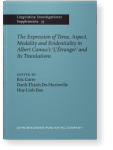Chapter 5
À propos d’un conflit aspectuo-temporel engendré par certains
usages du passé composé
In Camus’s novel L’Étranger, the
almost systematic use of the passé composé (PC) may
cause, in temporal subordinate clauses, an aspectuo-temporal
conflict. This conflict occurs when the PC in the subordinate clause
is forced, for narrative reasons, to refer to the past resultative
phase of a situation. This article presents a detailed analysis of
the various dimensions of this problem. It shows that its perception
as a problem of wording may sometimes result in an inappropriate
choice of tense. A hypothesis is formulated whereby this aspectual
conflict is resolved by an extension of the lexical meaning of the
verb in the subordinate clause, which entails the absorption of the
resultative phase. The article concludes by assuming that some PC in Camus’ novel contribute to the experience of the
absurd for the reader.
Article outline
- 1.Introduction et mise au point
- 2.Sémantique du passé composé
- 3.Le passé composé dans les subordonnées en
quand
- 3.1Les subordonnées en quand
- 3.2Relations temporelles exprimées par la construction
« quand / lorsque-P1,
P2 »
- 3.3Signification de la conjonction
- 4.Analyse du conflit aspectuo-temporel
- 4.1L’effet de phrase-labyrinthe
- 4.2Réalité psychologique du conflit: Quelques indices
- 5.Résolution du conflit
- 6.Conclusion et ouverture: Retour à Meursault
-
Remerciements
-
Remarques
-
Références
Article language: French
